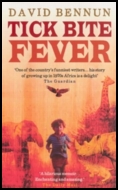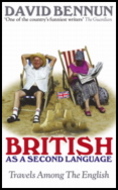| Text to separate 1 |  | Text to separate |  |
| Text to separate 1 | Tick Bite Fever | Text to separate | British As A Second Language |
|
Available now from Ebury Press:
British As A Second Language More details here Click here to buy it Also published by Ebury: Dave's highly acclaimed African memoir Tick Bite Fever |
| Television Reviews for Sunday 4th January [The Mail On Sunday, 2004] THE STORY OF SOUL TO SOUL BBC4, Friday **** TIME SHIFT: MISSING BELIEVED WIPED BBC 4, Monday *** ARENA: ALEC GUINNESS, A SECRET MAN BBC2, Monday *** THE MAYOR OF CASTERBRIDGE ITV1, Sunday and Monday *** THE BRIDES IN THE BATH ITV1, Wednesday ** THE RETURN ITV1, Tuesday * THE STORY OF ABSOLUTELY FABULOUS BBC1, Friday * THE WELSH GREAT ESCAPE Channel 4, Tuesday *** AS I WATCHED this week's telly, two thoughts stuck in my mind. That's two more than usual for this wobbly time of year, so I'll jot them down while I still can. One: the BBC is indispensable, to be cherished, cheap at the price of the licence fee. Two: the BBC is infuriating, arrogant and all too frequently hapless. These aren't contradictory views. They sit either side of the gulf between what the Beeb does and the way it operates. For example: BBC4 is by a long way my favourite channel of the last twelve months. For anyone even faintly interested in culture and the arts, it's a joy. But BBC4 is also a ghetto, a digital hideaway for programming that was once available on BBC2, where those who watch terrestrial TV out of habit or Hobson's choice could find it. It's as if the Tate Modern has been relocated from London's South Bank to the Orkney Islands. Maybe Freeview will make BBC4 more accessible. But will the formerly robust BBC2 recover from its current anaemia? BBC4's latest treat, The Story Of Soul To Soul, detailed a 1971 concert in Ghana. A slew of American performers, including Wilson Pickett and Ike & Tina Turner, made the trip. “They took us out on a boat,” observed one passenger, “and now they're bringing us back on a plane.” The musicians passed the flight with their routine recreations: “That plane could have flown itself over on the strength of the fumes.” When Maya Angelou - the Pam Ayres of black consciousness - was wheeled on as a commentator, my heart sank. Happily, she was soon replaced by the excellent Nelson George, a gold standard for pop culture pundits. You'll not hear him chortle, “Flares, eh? Tchoh! What was that all about then?” This was a mesmerising documentary, full of lovely details. In Ghana, platform boots were known as “guarantee shoes”, because the soles never wore out. Accra's Black Star Square, the concert venue, was a vast and spooky open concrete arena; an archetype of Marxist hubris dominated by a single arch which, ironically, gave the disconcerting impression of a half-finished McDonalds franchise. Also on BBC4, Time Shift: Missing Believed Wiped opened thus: “[From] the 1950s to the 1970s television seemed effortlessly to produce a stream of classic comedy, sitcom and drama that will never be repeated.” Sometimes it's just too easy. You do the honours. Excuses were made for the BBC's now notorious act of vandalism in obliterating much of this treasure. Everybody was interested in the future, not the past. Nobody could predict a boom in nostalgia. Maybe; but plenty of people wanted to preserve the shows - principally the technicians and artists who risked their careers to smuggle out tapes which the BBC is now desperate to get back. “How could they be so stupid?” raged John Cleese at his former employers. Of course, the corporation has changed since then. It waited only eight years from the launch of the rescue mission to officially join in. In any large organisation, hosts of managers will be more worried about admitting to a mistake than putting it right. Did Cleese's fellow Python, Terry Gilliam, base his Orwellian masterpiece Brazil on the BBC? That combination of quasi-Stalinist bureaucracy and old-fashioned English jobsworthiness is awfully familiar. Englishness of another kind was the subject of Arena, last redoubt of the arts on BBC2. Alec Guinness personified a nation's buttoned-up reticence. Arena dusted this invisible man with facts until a vague shape became discernable. It was very watchable, because Guinness himself was very watchable. But it offered no secrets. Perhaps none exist to be uncovered. Much as with Robert de Niro, we seem reluctant to admit that here might be a gifted actor with nothing to say about himself - and who noticed that in saying nothing, he created a useful mystique. Guinness's presumed bisexuality, and his conversion to Catholicism, explained little. They were simply there, like his taste in hats. Thomas Hardy, let us not dissemble, was a baleful old sod. I expect that's why he was last among the giants of English literature to have his oeuvre plundered by the frock'n'bonnet industry. Happy endings were not Hardy's business. Nor happy middles, beginnings or portions between. Compliments, then, to the team behind The Mayor of Casterbridge, who seldom diluted that bracing sourness. “Nothing is as you wish it,” said the ill-used Susan Henchard at one point, which is Hardy all over. We began at a fair with Susan and her babe-in-arms being auctioned off to a sailor for five guineas by her drunken husband. Abruptly, it's 18 years later and, what do you know, the missus is back and she hasn't changed a bit. Cold-cream technology was more advanced among the Victorian peasantry than you might suppose. The wife-seller, Michael Henchard, has in the meantime renounced drink, going on to gain wealth and the titular mayoralty. In Hardy's world, events may fall into place a trifle too neatly, but human frailties are never so easily accounted for. Secrets will out, and chickens always come home to roost. Ciaran Hinds delivered an impressively leonine performance as a man sincere in his wish to put right both his conscience and his actions, yet unable to counter his chief failings, obstinacy and temper. Inevitably, these are the ruin of him - and almost everyone around him. In the first of the two-hour episodes, Ted Whitehead did a notably deft job with the screenplay, which managed to sound natural without veering into anachronism, and conscientiously avoided most of the genre's banalities. The second part struck a wrong note almost instantly with the arrival of Lucetta, a vampy bonne bouche who threw not only the village but the script into turmoil. Henchard's rival, Farfrae, instantly mutated from pure-hearted, clear-headed swain into Wessex's own Robin Askwith (Confessions Of A Corn Merchant, anyone?) This in a story based on the glum principle that character is destiny, and try as we might, we can neither alter nor surmount it. I can't have been the only one pleased to see Lucetta peg it before the programme's carefully garnered credibility was entirely frittered away. At which point, Hardy's sluggish avalanche of vinegar and brimstone resumed its merciless rumble towards disaster. While The Mayor of Casterbridge employed costume drama specialists, The Brides In The Bath took the bold step of casting Martin Kemp in the lead. Those familiar with Kemp's role as a copper in the hilariously mistitled Serious And Organized would have instantly recognized his turn as a charming, taciturn maverick who outrages his superiors but gets results. The results in this case being a succession of murdered wives. As serial drowner George Smith, Kemp's depiction of psychopathy consisted of being very quiet, and then suddenly quite loud. It was rather like watching a heavily sedated Michael Caine. Otherwise, this was wearingly standard-issue period drama, right down to the formula dialogue. CHARACTER A: “I see that an issue particularly associated with our era has been in the news.” CHARACTER B: “I have an opinion on this issue completely in keeping with contemporary received wisdom and my own social circumstances.” CHARACTER C: “By way of demonstrating that the world is changing, I strongly disagree with your opinion.” Even that was preferable to The Return, which started off with some jaw-droppingly clumsy exposition and went downhill from there. Set in present-day Ireland, this tale of an alcoholic jailed for killing her husband was evidently intended to shock. And shocking it certainly was - less a potboiler than a steaming crock of Irish stew. The plot twists would have been rejected as improbable on Sunset Beach. I know that “serious”, issue-based dramas of this type are obliged by law to cast Julie Walters, but I'm surprised she didn't wriggle out of it upon seeing the script. Maybe it wasn't Ms Walters at all, but her evil twin. If evidence were needed that Ab Fab has become the thing it mocks, The Story Of Absolutely Fabulous provided it in spades. This type of self-congratulatory mirror-gazing would have been pilloried in the show's earlier runs. Its originator and cast may have reason to look well pleased with themselves (granted, Jane Horrocks never seems to need a reason), but that doesn't make it any more enjoyable to witness. Like many folk who are funny for a living, the Ab Fab crew were desperately dull in conversation with one another. How could these people create something so brilliantly comical and then be so boring about it? And more importantly, who put them up to it? Unassuming pleasure of the week had to be The Welsh Great Escape, the tale of how dozens of German officers fled a PoW camp in 1945. It was Dad's Army meets Just William, gaining a great deal from the wry observations of Bridgend residents who were children at the time. Bridgend was described as a pleasant market town, which I'm sure it is. But try getting a cab there at three am on a Saturday after you've finally eluded 70,000 Robbie Williams fans at Cardiff railway station. Now there's a real Welsh Great Escape. All material on this site is copyrighted © to David Bennun and may not be reprinted or reused without permission. Reet? Back to Film and TV |
| Text to separate 1 |  | Text to separate |  |
| Text to separate 1 | Tick Bite Fever | Text to separate | British As A Second Language |